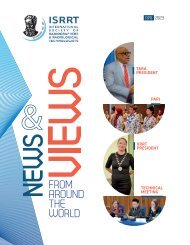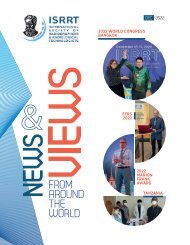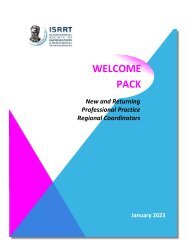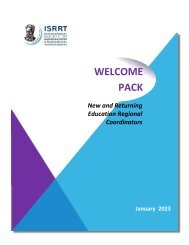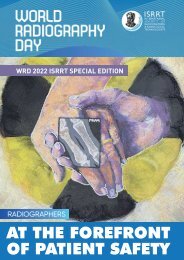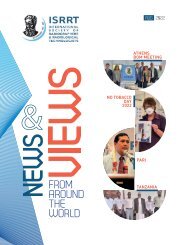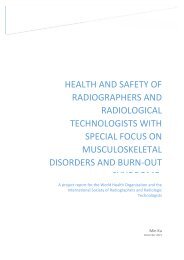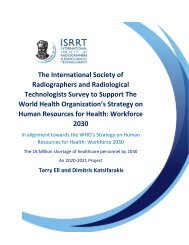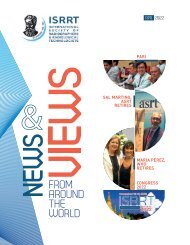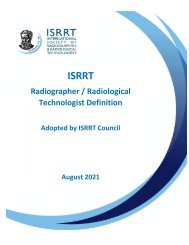ISRRT_COVID-19_book
You also want an ePaper? Increase the reach of your titles
YUMPU automatically turns print PDFs into web optimized ePapers that Google loves.
finding is also consistent with the Jowsey et al. 16 study suggesting that well-planned and<br />
purposeful lessons are imperative for making a positive impact online.<br />
Several socio-economic factors discussed in this study such as ‘IT poverty’ and bandwidth<br />
issues in shared accommodation, contributed to the theme around ‘online quality’. These<br />
correlate with findings in the meta-analysis completed by Fontain et al. 17 . He discussed that<br />
insufficient technical resources prevented students from meeting learning goals. This<br />
highlights the importance of the extra resources made available to students during this period<br />
from UWE such as the ‘Digital Capability Scheme’ 18 . The students in this study noted the<br />
increased assistance available to them.<br />
The ‘online quality’ theme also suggested that students had an affinity towards the course<br />
providers, commending them for their efforts in delivering the course despite the<br />
circumstances. However, refuted the suggestion that UWE had provided ‘blended learning’<br />
during the lockdown period. Sadeghi et al. <strong>19</strong> concluded that effective blended learning<br />
increased student satisfaction levels, therefore as the students in this study unanimously<br />
agreed that they were receiving online lessons only, this may explain their dissatisfaction and<br />
even undervaluing the course and student experience. These findings may help to understand<br />
why there is a record number of student complaints made against universities in 2020 20 and<br />
the statistics concerning dissatisfied students found in the <strong>COVID</strong>-<strong>19</strong> Insights Survey 21 .<br />
The final aspect of this study discussed concerns relating to returning to placement during the<br />
<strong>COVID</strong>-<strong>19</strong> pandemic. One theme identified was ‘BAME risk’. A student expressed worry about<br />
being more susceptible to <strong>COVID</strong>-<strong>19</strong> due to their ethnicity, causing anxiety and fear in<br />
returning to placement. Evidence suggests that currently, <strong>COVID</strong>-<strong>19</strong> has a disproportionate<br />
impact on BAME groups 22 , the student’s fear was therefore justified. This finding is consistent<br />
with Savitsky et al. 15 concluding that fear of infection caused a reluctance to attend clinical<br />
placement.<br />
Evidence from Savitsky et al. 15 and Surrati et al. 23 suggest that a lack of clear infection control<br />
measures and training caused anxiety in students attending clinical placement, this is<br />
supported by the findings in this study. Within the ‘effective teamwork’ theme, students<br />
expressed confusion regarding the correct level of PPE to employ and noted confusion<br />
experienced by other hospital staff and different departments too. These findings are<br />
43




